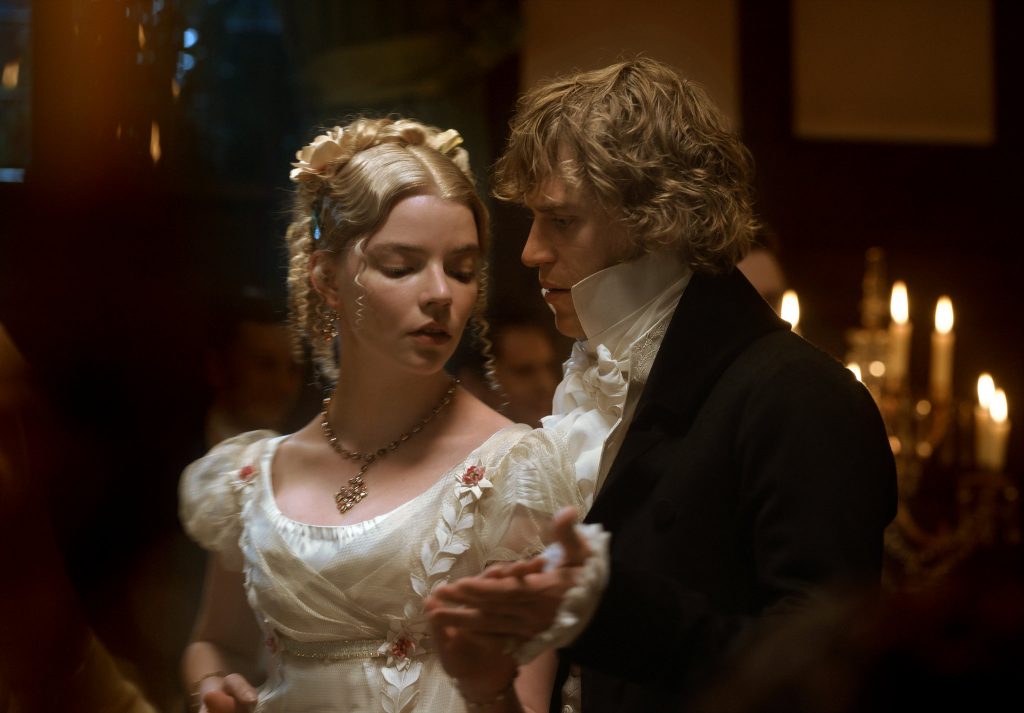By Ella Clucas
It is an unfortunate fact that not everyone loves a period film. Perhaps it’s the romantic frocks and frills, or the hyperfocus on traditional Englishness that gives some audiences the displeasure of viewing. I, of course, am no exception. Personally, I tend to veer away from anything too historical looking when scrolling through the choice of films on Netflix or Amazon Prime. As a student of English Literature, I have already developed a dislike for the Regency classics: I never much enjoyed either of the Bront├½s, and Jane Austen’s completed collection of novels has been sat on my bookshelf for years, untouched.
Enter Emma. As I was begrudgingly dragged along to a screening of the newest adaptation I wondered, am I going to sleep my way through the next two hours? How many pairs of tights will this movie contain? For those who aren’t familiar with the story, the protagonist Emma Woodhouse – handsome, clever, and rich – is somewhat of a socialite among the people of her town. The twenty one year old queen bee (played brilliantly by Anya Taylor-Joy) takes the younger, low-born Harriet (Mia Goth) under her wing, determined to play matchmaker in finding her a husband, though Emma herself is stubborn in expressing ÔÇÿno interest in matrimony at present’. In her quest to set her friend up with a worthy suitor, Emma often overlooks the consequences of her actions. She acts without consideration towards the feelings of others. She is spoiled, self-centred, and selfish. Both she and Harriet place far too much faith in her matchmaking abilities, a fact which sadly can only end in tears.

Sound at all familiar? Here’s a surprise: it took me nearly half an hour to realise that I’d seen this plot play out before, in none other than the iconic 1995 film Clueless, the most contemporary and perhaps well known adaptation of Austen’s 1817 novel. But how could this be? How could one of my all time favourite and most beloved movies be based around the exact type of literature that I despise? Needless to say that I was both baffled and impressed. I reserved my preconceptions for the remainder of the film, and whilst Amy Heckerling’s Clueless will forever hold a prime place in my heart, Autumn de Wilde’s Emma. was, surprisingly, an absolute joy.
Though the first thirty minutes or so were rather slow going, the production on this film alone is enough to warrant congratulations. Alexandra Byrne’s work on costume is unparalleled (though I counted at least seven pairs of tights, but maybe that’s a given). The music throughout the film adds movement and value, not to mention the abilities of cast members to play their on-screen instruments themselves. Most notably, what gives Emma. its unique spark is the indisputable vivacity of casting. When writing what would be the last novel published in her lifetime, Jane Austen said of Emma that she is a ÔÇÿheroine whom no one but myself will much like.’ It must be said that Taylor-Joy’s performance as the leading lady matches Austen’s vision. Taylor-Joy has a demanding talent for capturing Emma in all her childish glory. Emma is distinctly unlikable, particularly on Box Hill, where she cruelly humiliates Mrs Bates’ in front of all their friends – truly ÔÇÿbadly done’.

Johnny Flynn (who plays David Bowie in the upcoming movie Stardust) does well as a handsomely rugged Mr Knightley, who acts as Emma’s brother in law and playfully flirtatious critic. The stars of Netflix’s Sex Education have done well to infiltrate the film, as Connor Swindells and Tanya Reynolds play characters significant to the story’s development. Other remarkable performances include Miranda Hart’s Mrs Bates, and the wonderful Bill Nighy as Emma’s father, both of whom were perfectly cast in laugh-out-loud supporting roles. Though Austen’s work may not place in my list of favourite novels, there is no mistaking the light-hearted humour and romantic charm that characterises Emma. From 1817 to 2020, the story is truly timeless.
Watch the trailer here: Emma


